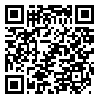Volume 4, Issue 1 (2019)
Manage Strat Health Syst 2019, 4(1): 47-56 |
Back to browse issues page
Associate Professor, Department of Healthcare Management, School of Management and Medical Informatics, Shiraz University of Medical Sciences, Shiraz, Iran
Abstract: (1924 Views)
Background: Health literacy was defined as the cognitive and social skills, which determine the motivation and ability of individuals to search, understand, and use the information, which maintain and promote their health. This study was aimed to assess patients’ health literacy and to examine its correlation with physician-patient interaction.
Methods: This analytical correlation cross-sectional study was conducted in Shiraz Shahid Faghihi hospital in 2019. A total of 200 patients were selected using the stratified-random method to participate in this study. The required data were collected using two valid questionnaires including Health Literacy for Iranian Adults (HELIA) and Interpersonal Processes of Care in Diverse Populations Questionnaire (IPC). Data analysis was conducted using SPSS 25. Descriptive statistics and Pearson correlation coefficient were applied in data analysis.
Results: Patients' health literacy and majority of its dimensions (with the exception of evaluation) were statistically correlated with physician-patient interaction among the studied population.
Conclusion: Effective interventions should be designed and implemented to promote health literacy both in general and patient populations. As a result, positive achievements can be created through improving the physician-patient interaction.
Methods: This analytical correlation cross-sectional study was conducted in Shiraz Shahid Faghihi hospital in 2019. A total of 200 patients were selected using the stratified-random method to participate in this study. The required data were collected using two valid questionnaires including Health Literacy for Iranian Adults (HELIA) and Interpersonal Processes of Care in Diverse Populations Questionnaire (IPC). Data analysis was conducted using SPSS 25. Descriptive statistics and Pearson correlation coefficient were applied in data analysis.
Results: Patients' health literacy and majority of its dimensions (with the exception of evaluation) were statistically correlated with physician-patient interaction among the studied population.
Conclusion: Effective interventions should be designed and implemented to promote health literacy both in general and patient populations. As a result, positive achievements can be created through improving the physician-patient interaction.
| Rights and permissions | |
 |
This work is licensed under a Creative Commons Attribution-NonCommercial 4.0 International License. |





